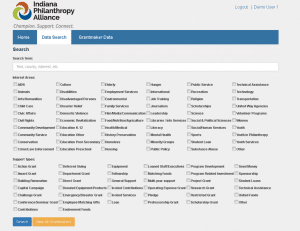By Lynn Sygiel, editor, Charitable Advisors |
Looking for a foundation directory that is Indiana centric? After an eight-year hiatus, the Indiana Philanthropy Alliance is reviving its publication to accomplish just that.
The new directory, available in March, will narrow its focus. Now, as an online publication, it will be limited to foundations based in Indiana that give to in-state nonprofits. In that past, the directory included some regional and national foundations that gave in Indiana.
With over a 1,000 foundation entries, each must have granted at least $25,000 in awards in the past year.
“There definitely are some new foundations that weren’t in there in 2008,” said Sarah Geis, director knowledge management at Indiana Philanthropy Alliance. “Being online it’s a quick and easy way to filter, and then the user can print out the ones that look like a match for their organization’s needs.”

Each entry includes information about a foundation’s proposal method, application procedure, geographic preferences, contacts, financials, grant deadlines, interest areas and support type.
“Grantmakers are glad that we are resurrecting the publication, and their grantees are looking forward to having access to again,” said Marissa Manlove, president and CEO of Indiana Philanthropy Alliance.
Geis said there will not be a printed version and the directory does not include past grants or list current grant opportunities. Since there are other sources available, the new edition will not include a scholarship section.
“Hopefully, it will be evergreen. We will be putting together a protocol for when we’ll be periodically going in, evaluating and reviewing the information,” said Manlove. “We have a learning curve and we may find some things that we may need to adjust in proving usability.”
Currently, there is early-bird pricing available.
[content_box box_type=”e.g. normal, confirm, warning, info, alert”]Grantmaking advice
With Manlove’s contact with grantmakers in Indiana, nonprofits often ask her for advice on approaching funders. Here are some of her suggestions.
“Certainly the recession created some challenges for foundations, and for a period of time, there was definitely a pulling back of the assets that were available, in order to do grant making. Everybody’s investment portfolios took a hit.
That’s built back up again to mostly pre-recession levels in terms of assets.
There definitely were some foundations that made some changes to the way that they were doing their grantmaking, limiting any multi-year commitments because they really weren’t in a position to do as much longer-term looking out. Some decided to pull back on certain types of grants, limiting capitol grants or grants from new grantees.
The recession sparked some of the changes, but it wasn’t the only reason why: I think grantmakers began to think a little bit more strategically, more targeted in their grantmaking approaches, how they might more effectively partner or learn about what other sectors, government sectors , the private business sector are they doing. Asking: Are there opportunities for ways to leverage what each other’s doing? You hear more these days about public private partnerships.
Not that those things weren’t happening back in 2008, but I think you’re probably hearing about it now.
What I tell (nonprofits who contact me about grantmaking) is it’s worth your while doing research. There’s some upfront time.
As you well know, nonprofits are lean on their staffing and having the time and luxury to doing that kind of research can be a challenge. But it’s worth it to spend some time researching.
The worst thing that a nonprofit can do is start sending out blanket proposals to foundations without knowing whether or not it’s a fit or not. It is unfortunately a waste of everybody’s time and can have the unintended consequence of putting a bad taste in program officers’ mouths. “This organization isn’t even taking enough time to know, they’re sending us this request for xyz, and we clearly say on our website what we fund and this is it.’
It’s worth it to spend the time researching.”
[/content_box]

